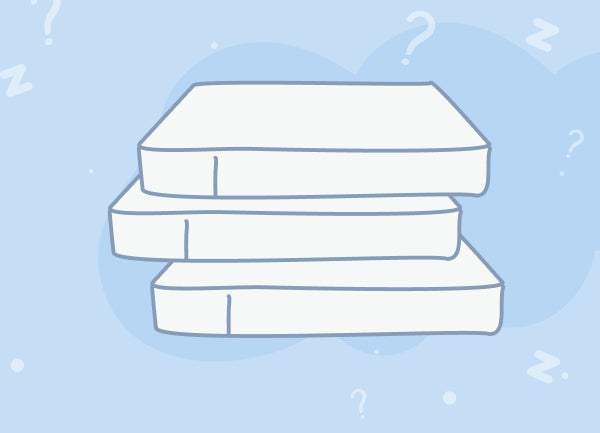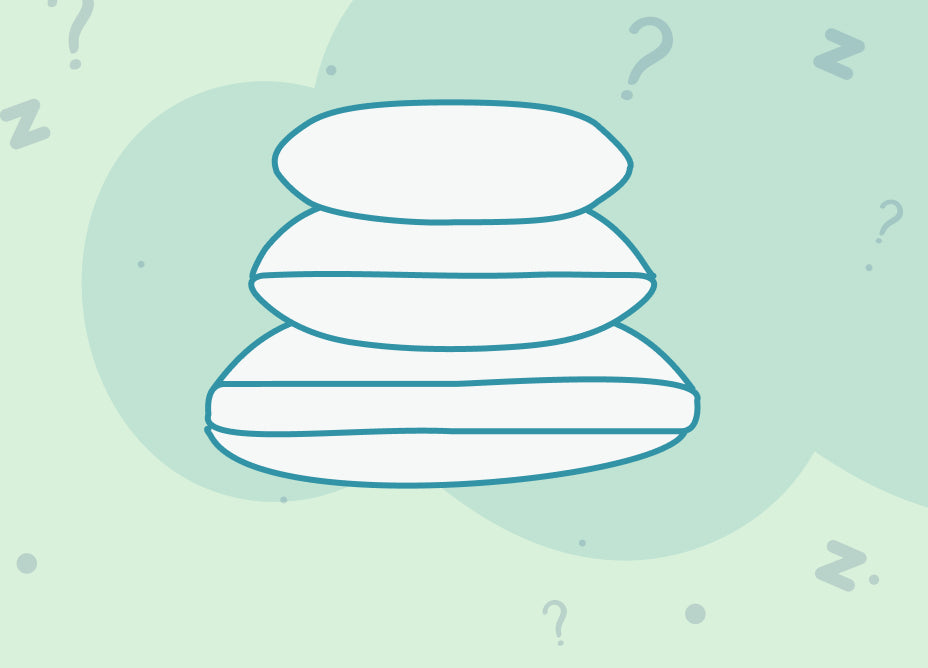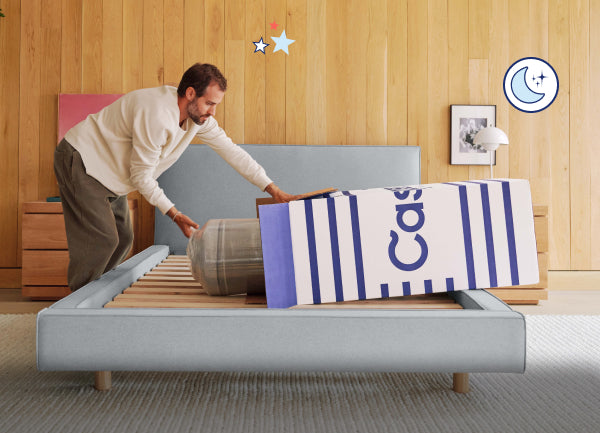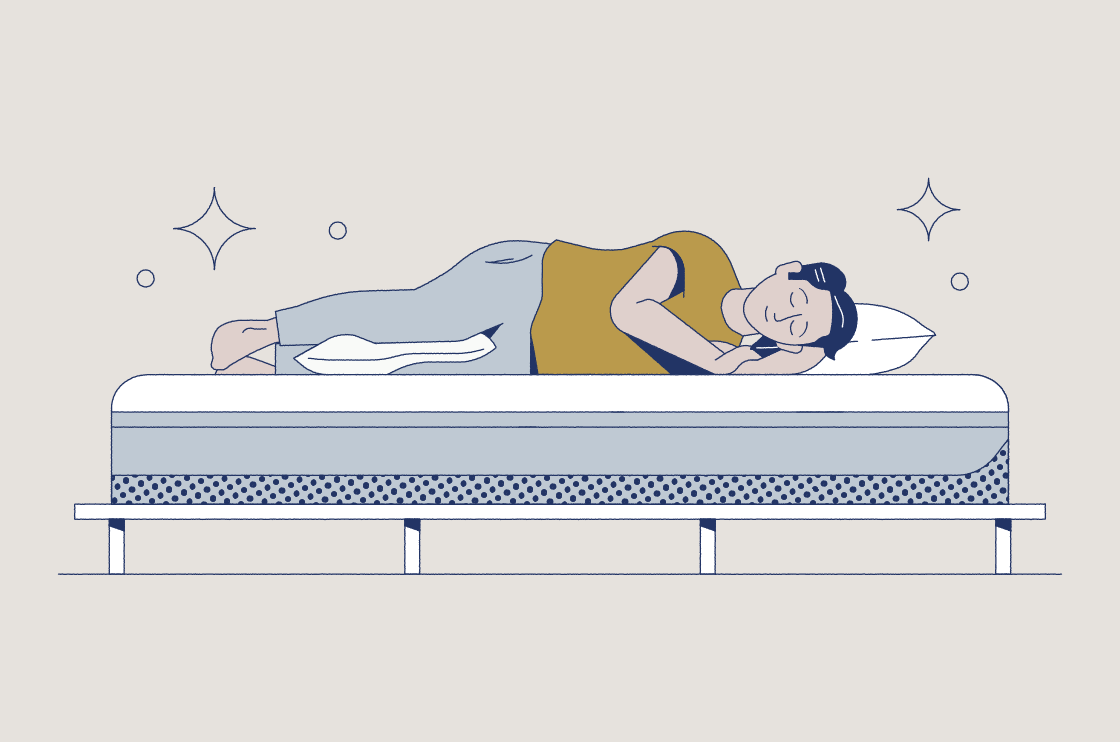Disclaimer: This article is for informational purposes only and should not be taken as medical advice.
Can a mattress cause back pain? If you constantly wake up with a stiff, sore back, you may wonder if your mattress is the culprit.
If your mattress is old, isn’t a good match for your body, or is otherwise not ideal for supporting your favorite sleep position, it could be contributing to back pain. Let’s take a look at some signs that your mattress may be a factor.
How To Tell If Your Bed Is Causing Back Pain
If you’re coping with back pain, you’re not alone. It’s estimated that 50–80% of adults experience at least one episode of back pain in their lifetime.
Serious or chronic pain always warrants a trip to your doctor to uncover the root cause. But if your aching back feels better after you’ve been up and moving for a while, your mattress may be the cause. Here are some telltale signs.
1. You Wake Up With Back Pain
While it may seem obvious, morning pain is one of the first signs that you and your mattress may no longer be friends. If you feel fine when you go to bed but wake up groaning and clutching your lower back, your mattress could be a contributing factor. A problematic mattress can contribute to spine misalignment, which in turn leads to morning pain.
2. You Struggle To Get Comfortable In Bed
Flailing around all night will not only keep you awake, it could also be related to your back pain. When you toss and turn trying to find a comfortable position, it’s a sign that your mattress might not be the right fit for you.
3. You Wake Up Often at Night

In one study, over 35% of adults reported waking at least three nights per week, and 23% woke at least once every night. Even though nighttime waking is common, if it’s a new or worsening problem for you, consider whether your mattress is giving you the support you need to stay comfortably asleep.
4. You Feel Like You’re Rolling Off Your Bed
Does it feel like you’re about to roll off the edge of your bed? That’s a sign that your mattress lacks good edge support. Lack of edge support may mean that your mattress structure is deteriorating and contributing to your morning pain.
5. You’re Folded Like a Taco
Your mattress shouldn’t make you into a human taco, but that’s exactly how it can feel when you sink in and your mattress folds around you. Not only is a sinking mattress not able to keep your spine aligned, but it can also restrict your nighttime mobility, leading to pain when you wake up.
6. Your Mattress Is Saggy
Unlike a sinking mattress that enfolds your whole body, a saggy mattress droops where you need support the most — usually right under your lower back. Mattress sag can cause spine misalignment, which can contribute to back pain.
Select Casper mattresses include Zoned Support™ which is designed to ergonomically align your spine, giving extra support where you need it most.
7. You Feel Like You’re Sleeping On a Board
There’s a difference between a supportive mattress and one that’s too hard. A too-hard mattress forces your spine into an unnatural position and creates pressure points. Your mattress should have some give to keep your spine neutral.
8. You’ve Got Things That Go Lump In the Night

This will probably come as no surprise, but sleeping on a lumpy mattress can make your back hurt. Although rotating your mattress or adding a good mattress topper may fix things in the short term, lumps are a good sign that it’s time for a mattress upgrade.
9. Your Mattress Is Past Its Prime
Alas, nothing lasts forever. As a general rule, you should think about replacing your mattress every 7-10 years, although that number can vary depending on the type of mattress you have. If your mattress is too old, it could be contributing to morning pain.
10. You Don’t Feel Rested When You Wake Up
If you’re getting good sleep, you’ll wake feeling rested and refreshed. But if your morning routine has you saying “Ugh!” instead of “Aaah!” it’s time to consider whether your mattress could have something to do with it.
11. Your Back Pain Fades After Waking
If stretching and a good hot shower alleviates your morning aches, they might be related to your mattress. But if your back pain is an all-day kind of thing, there may be other (or additional) causes.
Even if you suspect your mattress is to blame for your sore back, it’s important to chat with your healthcare provider if your back pain persists throughout the day and is more than just a morning nuisance.
What Firmness Is Best for Back Pain?

There’s a common myth that you need a firm mattress to get the best support for your spine. But firmness and support aren’t the same thing.
- Firmness relates to how much you sink into your mattress.
- Support relates to how well your mattress supports your spine to keep it aligned.
So, does that mean that mattress firmness doesn’t matter? It’s not quite that simple. Let’s take a look at the differences between soft and firm mattresses.
Soft Mattress
Is a soft mattress bad for your back? It is if it’s so soft that it doesn’t support your spine. If you sink into the mattress so that your hips are lower than your shoulders, your mattress may be too soft and could be contributing to back pain.
Keep in mind that weight is a factor when it comes to mattress firmness. The heavier a person is, the more likely they are to sink into a too-soft mattress.
Firm Mattress
Can a hard mattress cause back pain? Although people used to believe that a very firm mattress was the best thing for a bad back, research doesn’t agree.
One double-blind study tested participants who experienced low back pain while in bed, on waking, and throughout the day. The participants who slept on a firm mattress had worse outcomes after 90 days than those who slept on a medium-firm mattress.
Does that mean that firm mattresses are always bad for back pain? Once again, weight is important. The heavier someone is, the firmer their mattress may need to be to provide the right level of support for their spine.
Best Mattress Firmness for Back Pain
For many people, a medium-firm mattress is the best choice for reducing back pain.
One small study tracked the sleep quality of adults with lower back pain. After tracking the participants’ sleep quality for 21 days on their own mattresses, they were given medium-firm mattresses with foam and latex layers. After 12 weeks, the participants had progressively less back pain and stiffness.
Your mattress firmness may not be right for you if lying on it causes your spine to become misaligned. Look at it this way:
- Your mattress is too soft if your hips sink lower than your shoulders.
- Your mattress is too firm if your hips and shoulders lie flat on the surface.
- Your mattress is just right if your mattress contours to your body shape and keeps your spine aligned.

Looking for a mattress that’s just right? We have thoughtfully designed mattresses at every price point, so you can say sayonara to nighttime back pain without breaking the bank.
- Casper Element® Mattress: A seriously comfortable sleep at our coziest price
- Casper OriginalTM Mattress: Our most popular mattress, engineered for cool, comfortable sleep
- Casper Nova® Hybrid Mattress: Our most plush mattress is also supremely supportive
- Casper WaveTM Hybrid Mattress: Our most supportive mattress, now combining foam and springs for added lift, airflow, and edge support
Should You Worry About a New Mattress Causing Back Pain?
Getting a new mattress is exciting. You anticipate sliding between the sheets and sleeping blissfully on your brand new bed. But then you struggle to get comfortable at night and you wake with morning pain or stiffness. What gives?
Your body needs time to adjust to a new mattress. Many of us adopt poor posture over the years, and a bad or old mattress can compound the problem. It’s normal to feel some initial discomfort or soreness as your body adjusts.
Sleep on your new mattress for at least a month. If your pain doesn’t improve, and especially if it worsens, your new mattress may not be the right fit for you.
Want to try out your new mattress without the hassle? Casper mattresses come with a 100-night risk-free sleep trial and an easy return process for more snoozing and less stressing.
Best Mattress for Back Pain
When it comes to the best mattress for back pain, there’s no one-size-fits-all solution. Ultimately, the best mattress for back pain is one that provides you with the perfect mix of softness and support. It relieves pressure points and keeps your spine neutrally aligned.
But here’s a reason to justify mattress shopping: Research shows that upgrading to a new mattress is likely to improve your sleep quality no matter what. The same study also showed that people sleeping on the cheapest mattresses saw less pain reduction than those who slept on mid- to higher-priced ones. Quality counts!
When in doubt, upgrading to a high-quality medium-firm mattress could be the best option for easing back pain so you’ll wake energized and restored.
The Casper Wave Hybrid Mattress with Zoned Support™ Max provides continuous ergonomic zones with gel pods designed to help give you perfect spinal alignment.











